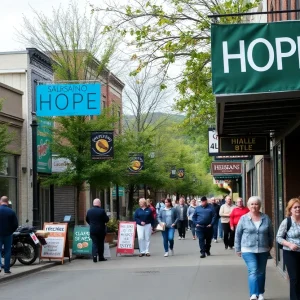Asheville’s Grassroots Water Relief Effort Blossoms in the Wake of Tropical Storm Helene
Asheville, a vibrant city nestled in the Blue Ridge Mountains of North Carolina, recently faced a significant challenge when Tropical Storm Helene battered the area, leaving many residents without running water. While water distribution may not be the primary expertise of Elle DeBruhl, a recruiter for multinational accounting firm Ernst & Young, she and her husband, Buddy, took it upon themselves to make a difference. Their inspiring story of resourcefulness and community spirit has caught the attention of many.
A Helping Hand for the Community
With access to industrial-grade containers called intermediate bulk containers (IBC) totes at Buddy’s family farm in nearby Weaverville, the DeBruhls hatched a plan. “We outfitted our own rig—a flatbed trailer hitched to a pickup truck—with six of these totes and started pulling water from wells and ponds at the farm,” Elle explains. Their mission? To bring nonpotable flushing water to the vulnerable populations in Asheville that were struggling to cope without access to clean water. It was a noble goal, stemming from a simple desire to help.
From Small Beginnings to Flush AVL
In just a few days, this grassroots initiative blossomed into what is now known as Flush AVL. The DeBruhls teamed up with co-founder Molly Black, an executive with the American Cancer Society, alongside a band of dedicated volunteers. Through partnerships with organizations like Highland Brewing, BeLoved Asheville, and Plenty.org, Flush AVL quickly distributed an impressive 400 totes around Asheville, keeping them filled with nonpotable water. Now that running water has been restored, the focus is shifting to smaller communities hit hard by Helene.
Operation Redeploy
“We’re on Operation Redeploy, and that’s just as fulfilling as the original project,” says Elle. With numerous totes still in circulation, the group is actively working to assist communities that remain in need. Elle shared her excitement about the new mission and how Flush AVL will aid those in places like Swannanoa, Burnsville, Marshall, and Hot Springs.
The Rapid Growth of the Initiative
Elle reflects on the unexpected speed at which Flush AVL grew, pointing to the community’s involvement. “Shortly after we started, the bucket brigades followed us around, using our water and helping low-income housing units, veterans’ homes, nursing homes, and individuals who couldn’t carry a five-gallon bucket. It was incredible,” she said. Thanks to the generosity of people like former NASCAR star Dale Earnhardt Jr., the DeBruhls were able to secure a large number of IBC totes to meet the burgeoning demand.
Building Community Connections
Connecting with Molly Black was a serendipitous moment. Elle’s husband works in the Register of Deeds office, where local officials recognized the opportunity for collaboration. “Molly works on her doctorate in public health, so she understood the implications of not having flushing water. She helped us map out our delivery strategy,” Elle notes. The coordination of logistics and volunteer efforts quickly took shape, allowing the team to fill the community needs efficiently.
Meeting Local Leaders
The logistics of getting totes to those in need required immense effort and relationship-building. Elle recounted her experiences in smaller communities, where local pride often meant resistance to help. “When we approached Marshall, I found out that the fire department was gone. I had to spend time networking just to reach someone in charge,” she shared. But once they proved their intent, the community leaders were all ears, ready to receive assistance.
Future of Flush AVL
As the focus shifts to other communities still struggling with water accessibility, the future of Flush AVL remains hopeful. “We realize that these totes could save lives in these impacted areas for a long time to come,” Elle remarks. The innovative initiative led by the DeBruhls not only highlights the power of a unified community response but also raises questions about long-term sustainability. “We are thinking about what happens after everyone has access to water again. This experience has shown me the power of collaboration and the need for ongoing support in these areas,” she adds.
In a world where challenges can seem overwhelming, the DeBruhls and their team serve as a reminder that grassroots efforts can have a monumental impact. They exemplify the strength of community, demonstrating that even in the face of adversity, kindness and ingenuity can pave the way for healing and recovery.






